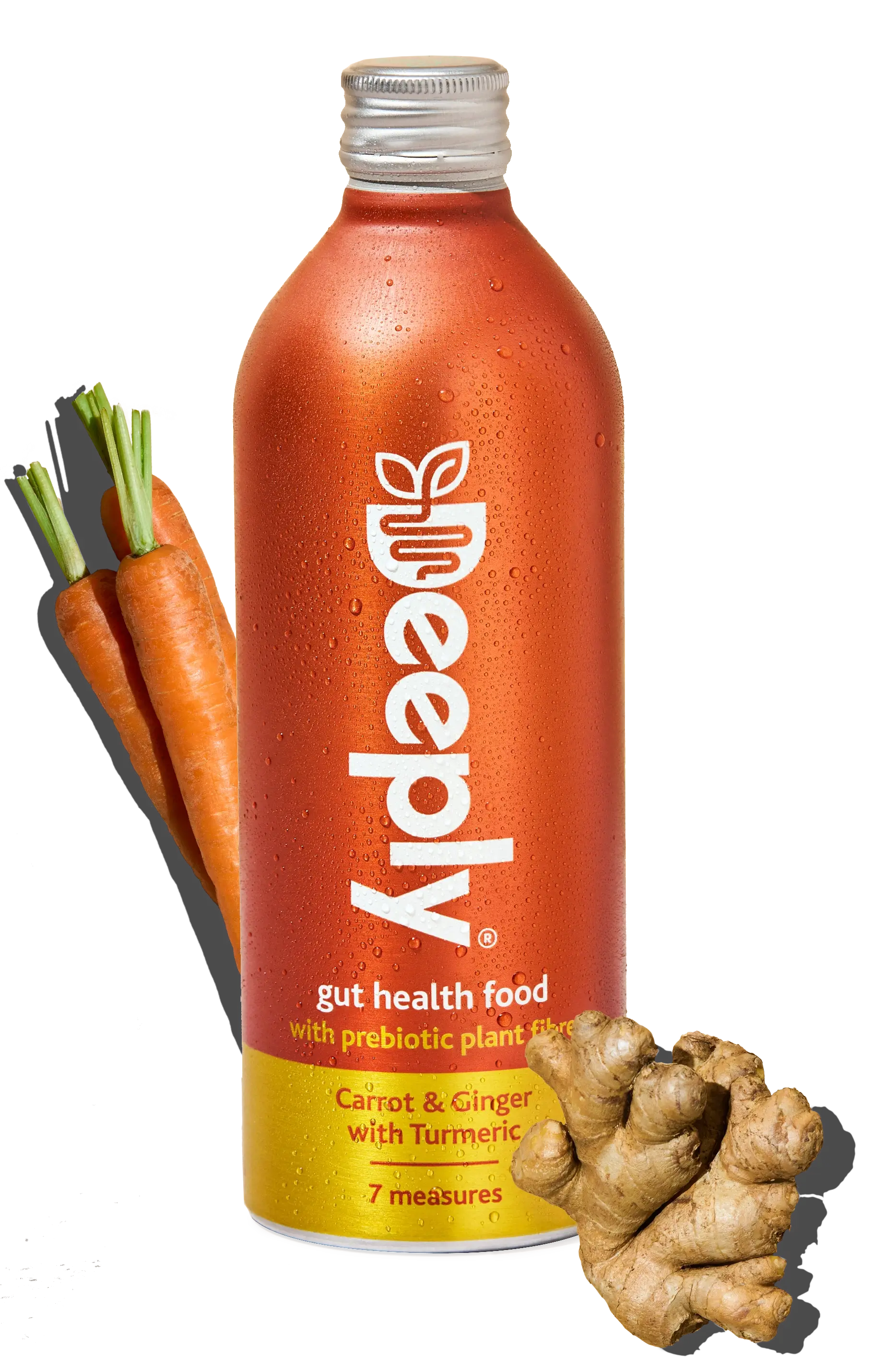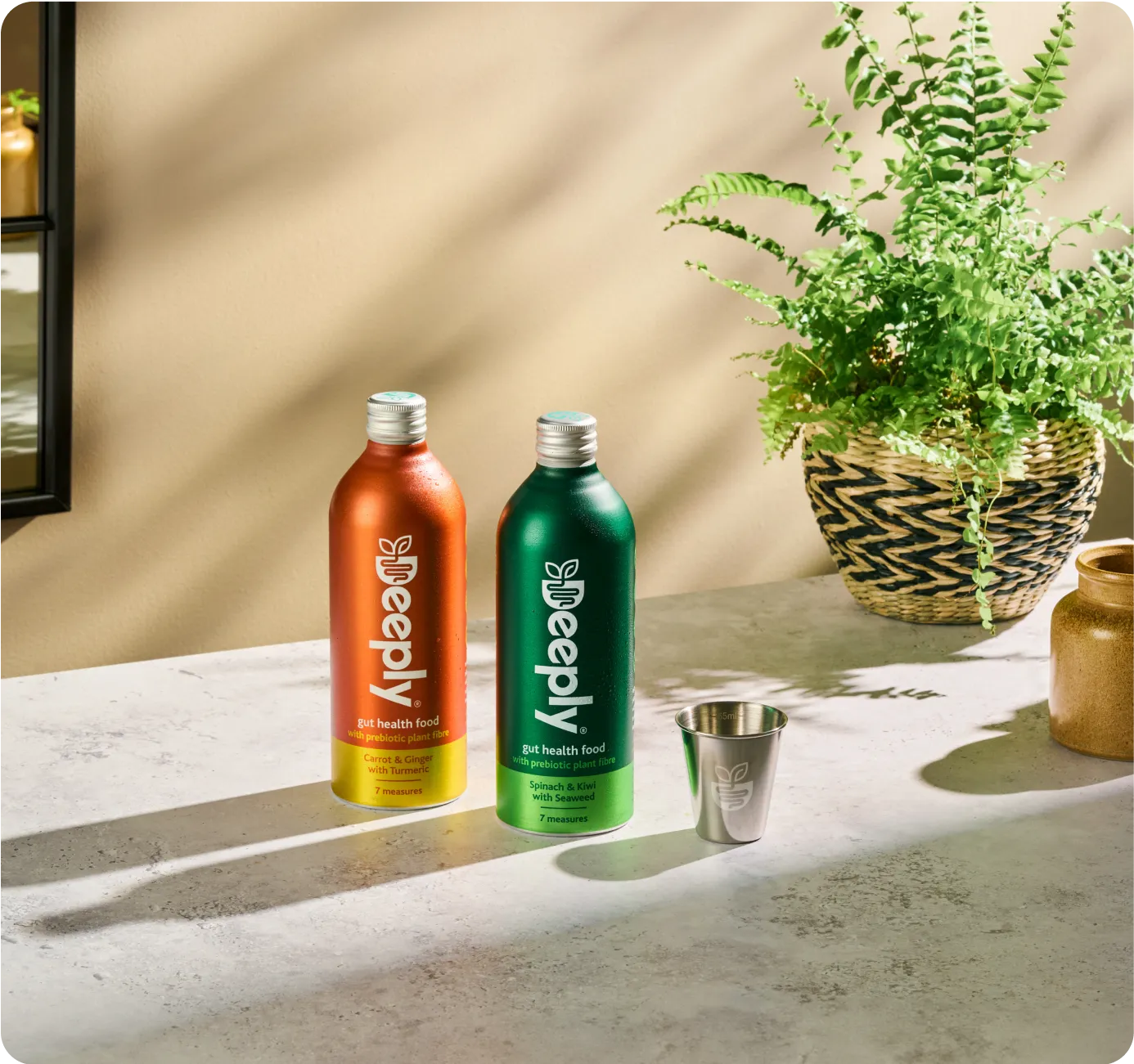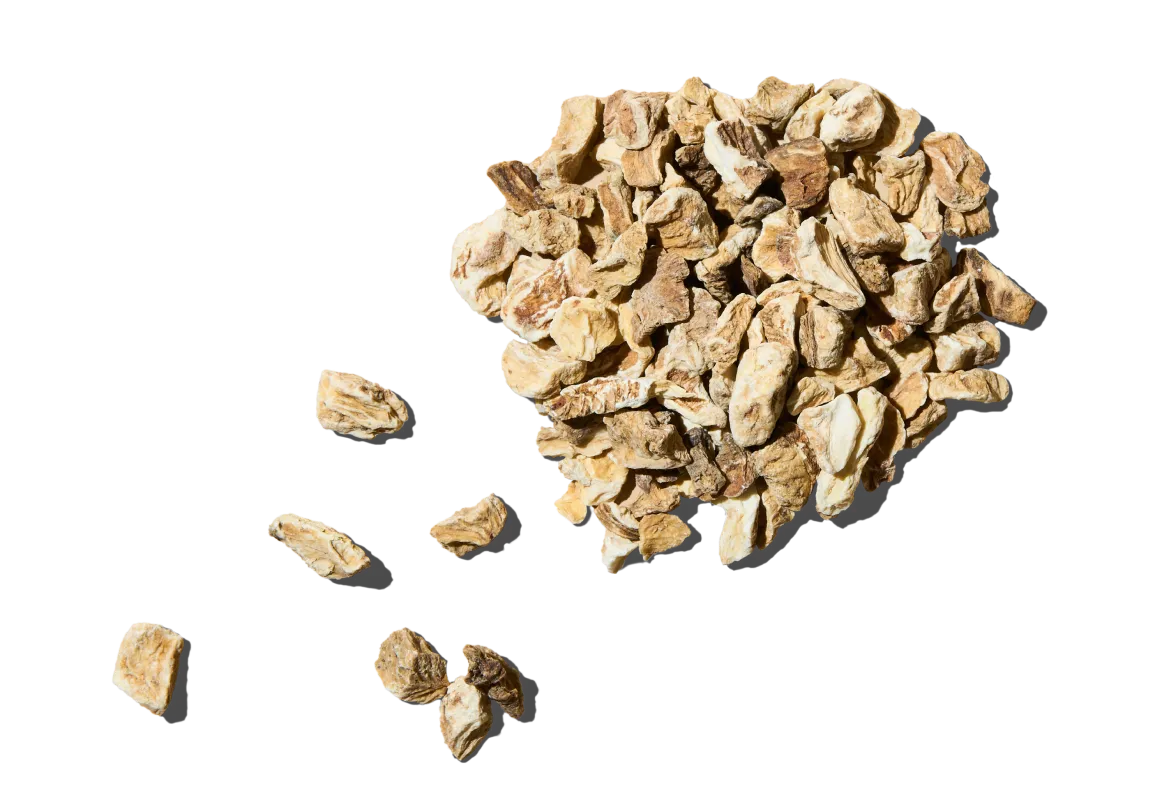
You're not alone.
You're certainly not weird or abnormal either, if you often feel bloating, constipation or other uncomfortable feelings, which get in the way of living your best life.
Infact we know that as many as 1 in 4 adults (26%) suffer chronically, and often in silence.
But that doesn't have to be the case.
All of these symptoms signal that unfortunately, things aren't quite right in your gut. Luckily, science has now clearly shown there is a simple and enjoyable way for you to nourish your gut back to health with powerful prebiotics.
Scroll down to learn more, or...
So here's the deal: Science has helped us understand that trillions of bacteria (known as the gut microbiome) hang out in the intestines and work together to break down food that we are unable to digest. They normally work away in, but if not treated well over time, unhelpful or 'bad' bacteria creep up to higher levels.
The result? Well, it could be they produce excess gas (know the feeling?), or play a role in slowing down contents of the bowel, causing less regular poos, and causing a backlog of - well - everything, at the same time.
The good news? Some of the latest research has shone that rather than attempting to add the right bacteria (probiotics), we can selectively feed all the existing 'good' bacteria in our gut what they love: prebiotics.
Prebiotics are special fibres - found in various plant sources. A diet high in prebiotics is essentially giving our good bacteria the VIP treatment - encouraging their multiplication. The more good bacteria we have, the better we heal and feel.
It's because of this, that we created Deeply - A great-tasting and really powerful daily dose of prebiotics to keep your gut nourished.
Bloating is that annoying, uncomfortable and quite often mood-lowering feeling of fullness of swelling in your belly area.
No one has ever felt good when bloated. It’s the result of too much gas building up inside creating pressure, and causing parts of your gut to expand.
A lot of factors can be responsible for bloating. Sometimes it can be as simple as swallowing air when eating (or drinking fizzy drinks), eating too much in general, or wearing tight clothes – hindering your digestion process.
But often it’s caused by the bacteria in your gut fermenting some of the foods you eat and producing excess gas (it’s not necessarily that the foods themselves are the problem, more how your gut microbiome is processing them). Some gas production
after a meal is normal, and minor bloating can quickly, but if not it could be a sign that things aren’t working well in your gut.
Normally a lot of the gas produced is absorbed into your bloodstream, only to be exhaled out later. But if your gut lining isn’t healthy this can make things difficult, so you start to, well, feel the pressure.
There could be a backlog due to constipation, keeping things moving plays a key role
in preventing excess gas build-up.
Stress can play a role, as it often diverts blood away from the gut, alters gut bacteria and prevents food from being digested properly.
Prebiotics can help your good gut bacteria to flourish. These guys support your ‘gut-brain axis’ which has an effect on mood and mental well-being - we know that being less stressed often helps reduce bloating.
Having more good gut bacteria also means you’ll digest food properly. If you’re passing gut contents through too quickly, then bloating can occur as undigested foods ferment too quickly, producing that excess gas.
At the same time a healthy gut favours regular bowel movements so if gas buildup has been caused
by contents not moving through quickly enough, prebiotics can help resolve a sluggish gut and prevent air from getting trapped.
This is certainly true for those suffering from constipation - 56% of those with chronic constipation reported bloating at the same time.
Restoring your gut back to health means feeding the good gut bacteria their optimal diet.
Make sure your diet is high in fibre (it’s recommended to eat 30g per day) ideally the prebiotic kinds.
Overtime supporting good bacteria will help ensure your gut moves things along at the right pace, whilst also maintaining a healthy gut lining.
Make sure you have identified any food intolerances– for example, some people are intolerant to foods known as ‘FODMAPs’, these include lactose (found in dairy) or fructans (found in certain fruits and vegetables).
Make sure you stay active. Gentle movement and stretching can help gas move through your gut. Lying flat and stretching out may also help (but we think best done when at home).
Some people find heat packs and abdominal massage can help release trapped gas too.
And don’t forget, to make sure you’re chewing your food well, avoiding fizzy drinks and eating when relaxed - not stressed out!
If lifestyle measures are effective you’ll usually know immediately, as things like looser clothes and gentle massage can relieve gas straight away.
Dietary changes like removing food intolerances and increasing fibre can often improve things within a few days.
However sometimes even though your gut microbes are changing straight away, the benefits can take 3-4 weeks to emerge fully as your gut adapts to a higher-fibre diet.
Feel free to drop us a message any time when it comes to questions about gut health or about Deeply.
If you have tried dietary and non-dietary measures but symptoms still persist we recommend you speak to your GP or qualified dietician, but remember, if your symptoms are severe, and cause notable pain or are accompanied by any other symptoms such as being sick, seeing blood in your poo, or diarrhoea you speaking to your GP should always be the first course of action.
Put simply, constipation is when things down there aren’t moving like they should, and it doesn’t feel great. More specifically constipation is usually diagnosed if you haven’t had a poo at least three times during the last week, or if your poo is unusually dry, hard, or lumpy.
To go with this, you might often find you are straining or in pain when you go to the toilet and feel like you haven’t fully emptied your bowels. But you’re not alone, 33% of adults surveyed have
said to struggle with constipation.
There are actually multiple different kinds of constipation, characterized by different issues with your gut motility, and often with different things causing them. Ofcourse the one thing they have in common is indicating that your gut microbiome is not healthy.
In a healthy gut, the transit time of your food from when you eat to when you eventually poo would be less than 24 hours.
Dietary causes of constipation often include not eating enough fiber or drinking enough fluids. However non-dietary factors can also play a role, these include physical factors like not moving much and being very inactive, as well as psychological things such as stress, anxiety or depression.
Prebiotics may be a great way to help resolve constipation because they are key to creating a healthy gut microbiome.
Chicory root inulin has been proven to contribute to normal bowel function by increasing stool frequency. Guidelines show the proven effective dose is 12g throughout the day.
One prebiotics are thought to have this effect is by stimulating particular types of bacteria to grow (such as Lactobacillus and Bifidobacteria), which in turn produce important ‘post-biotic’ chemicals, such as a chemical called butyrate. These chemicals can change gut motility by stimulating the contraction of muscles in your colon, great for keeping things moving. Yes, we continue to be amazed by the gut too!
Fibre, fibre, fibre … but not too fast!
The most common form of constipation can be managed through diet. However, changes to diet should be managed carefully to allow your gut to adapt. Prebiotic fibre is particularly important. A well-known prebiotic called chicory inulin has been proven in large studies to directly support normal bowel movements by increasing stool frequency. Most people with constipation would do well to have this one on their menu!
Any supplementation of inulin can be helpful, but research suggests that getting 12g a day is ideal for obtaining the beneficial effect, so it’s important to make a conscious effort to consume foods that are high in inulin, or specific products such as Deeply that make consuming more inulin easier.
The gut and it’s symptoms are complex, and not all instances of constipation are fixed through dietary changes, if your symptoms fail to improve or get worse always speak to
your GP.
Try to keep moving. Gentle movement, exercise, and stretching are known to help the
gut move it’s contents along! At the same time think about your mental health. Finding ways
to reduce any stress, anxiety or depression is an important factor as well.
Most people will start to notice an improvement in their stools within a few days of taking the right intervention.
However, for others it may take a few weeks.
You can always drop us a note to ask any questions about gut health or Deeply.
However, when it comes to your constipation we always recommend talking to your GP or a qualified dietician. It can be a complex symptom to manage and not all solutions will work for everyone.
Remember, if your symptoms are severe, and cause notable pain or are accompanied by any other symptoms such as being sick, or seeing blood in your poo you speaking to your GP should always be the first course of action.

Unlike many health routines where we often have to trust or hope that things are improving when making Deeply part of their routine, most people experience positive changes within days.
The proof isn’t in the pudding, it’s in the poo. You know when prebiotics are working because within days they can help to achieve better digestion and more regular, well-formed poos. This is a sign things are improving, and many will feel their gut work better within days of making changes.
Other changes you might see if you're gut health improves might include reduced bloating, constipation and other digestive discomfort.
Packed with prebiotic plant fibre that selectively feeds your good bacteria to nourish your gut microbiome and support all-round health.
Created by a deeply passionate team of nutrition experts and foodies – obsessed with the positive power of prebiotics.

Made with real fruit, vegetables, plant extracts, a measure of Deeply is a taste-bud-popping way to start your day.
Deeply’s special formulation not only boosts your gut health but also contains naturally sourced vitamins D3 and B9 for immune support.
Packed with prebiotic plant fibre that selectively feeds your good bacteria to nourish your gut microbiome and support all-round health.
Made with real fruit, vegetables, plant extracts, a measure of Deeply is a taste-bud-popping way to start your day.
Created by a deeply passionate team of nutrition experts and foodies – obsessed with the positive power of prebiotics.
Deeply’s special formulation not only boosts your gut health but also contains naturally sourced vitamins D3 and B9 for immune support.
One box contains 4 bottles (28 measures), packed with powerful prebiotic fibre to deeply nourish your gut.
Enjoy FREE DELIVERY on all plans.
One box contains 4 bottles (28 measures), packed with powerful prebiotic fibre to deeply nourish your gut.
Enjoy FREE DELIVERY on all plans.
One box contains 4 bottles (28 measures), 2 of each flavour, packed with powerful prebiotic fibre to deeply nourish your gut.
Enjoy FREE DELIVERY on all plans.



One box contains 4 bottles (28 measures), packed with powerful prebiotic fibre to deeply nourish your gut.
Enjoy FREE DELIVERY on all plans.

One box contains 4 bottles (28 measures), packed with powerful prebiotic fibre to deeply nourish your gut.
Enjoy FREE DELIVERY on all plans.

One box contains 4 bottles (28 measures), 2 of each flavour, packed with powerful prebiotic fibre to deeply nourish your gut.
Enjoy FREE DELIVERY on all plans.


01 The baobab fruit, from Africa's tree of life, is rich in pectin (a fibre shown to have significant prebiotic properties), vitamin C, phosphorus, and potassium. The fruit pulp has greater antioxidant activity than other superfruits such as pomegranate, bilberry and kiwi.

02 Taking 12g of chicory root inulin, a prebiotic, every day is proven to improve bowel function and can help with bloating, discomfort and constipation. Research has shown benefits including an increase of stool frequency accompanied by a softening of stool consistency - resulting in a positive impact on the quality of life.

03 Acacia fibre has been shown to selectively feed our good bacteria such as Lactobacilli and Bifidobacteria, the latter being one of the most significant organisms for gut health. Soluble dietary fibre such as Acacia stimulates fermentation and thus the production of Short Chain Fatty Acids such as propionate, butyrate, and acetate, which can benefit the digestive tract, metabolic health, cardiovascular health and immunity.

04 The Jerusalem Artichoke is another great source of inulin. This wonderful prebiotic fibre has been shown to support the growth of beneficial bacteria in the gut and
deter the unhealthy invaders.

05 This is derived from the wild
Undaria Pinnatifida seaweed (also known as wakame), which is grown in the pristine ocean waters of patagonia. This amazing marine ingredient brings together the complementary bioactivities of fucoidan and algal mannitol. Clinical studies have shown that it may improve digestion, immune function, and overall well-being. It is also a valuable source of minerals and other marine nutrients.